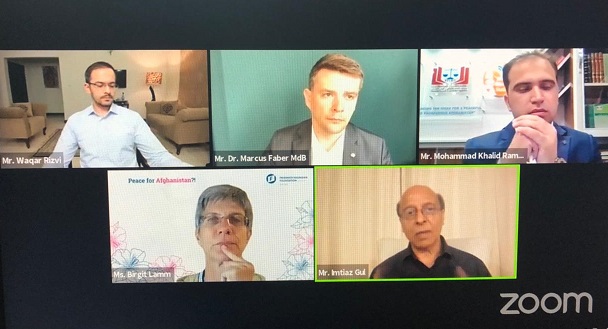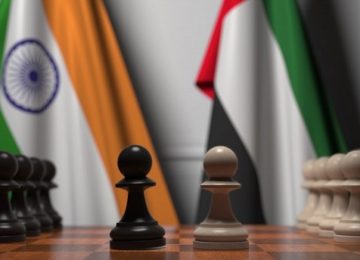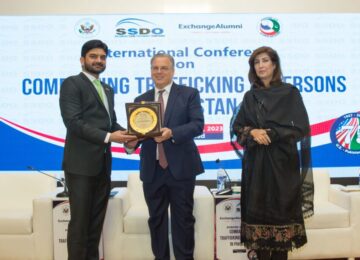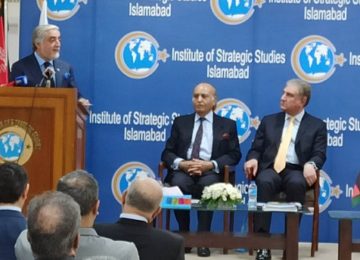May 28, 2021
Pakistan continues to urge Afghan stakeholders to find a mutually agreeable way out of the current conflict, said Mr. Imtiaz Gul while speaking at a trilateral (Pakistan, Afghanistan, and Germany) webinar organized by Germany’s Friedrich Noumann Foundation on May 27th, 2021.
He also indicated that currently there appears to be a grand international consensus on pushing the intra-Afghan dialogue. US, China, Russia, Iran, Turkey, Pakistan and the Central Asian Republics are unanimously urging both the Kabul government and the Taliban to find a mutually agreeable way forward.
Though the Peace process is stalemated right now, the Taliban’s demand for release of all prisoners and the removal of their leaders from the UN terror list remains unfulfilled.
Let us first consider the April 14th hearing at the US Senate Intelligence Committee, where the Director of US National Intelligence Avril Haines entitled China an “unparalleled priority” for the intelligence community, while the FBI Director Christopher Wray noted that his agency opens a new investigation that links back to the Chinese government every 10 hours.
The role of different global players in the peace process was also highlighted in the hearing’s report.
Russia is expected to continue pushing back against Washington so it can globally, employ techniques up to and including the use of force.
Moreover, Iran will remain a regional menace with broader malign influence activities, and North Korea will be a disruptive player on the regional and world stages.
Pakistan has the most crucial role to play for two reasons; one, its relations with Afghan warring factions since the days of the anti-Soviet Russian jihad, which helped lots of Afghans develop business interests in Pakistan, including people like former president Hamid Karzai, defense minister Rahim Wardak, Dr.Ghairat Baheer and so on.
Secondly, Pakistan’s geographical proximity with Afghanistan- 2560 km long border – and tribal relationships across the border make it almost impossible for Pakistan to stay indifferent to what happens inside Afghanistan – as much as the US cannot disregard what happens in Mexico or Canada. Pakistan is under a critical scrutiny of the US and its allies for its role in the peace process as well as strategic partnership with China.
Another key aspect was indicated in a New York Times report published on April 14th, which stated that western spy agencies are evaluating and courting regional leaders outside the Afghan government who might be able to provide intelligence about terrorist threats long after U.S. forces withdraw, according to current and former American, European and Afghan officials. The report also suggested that with this approach – rooted in the fear of an implosion after the US pullout from Afghanistan – the era of proxies akin to the 1990s might return.
The above discussion leads us to two conclusions; one, the peace process is stalled foremost by the internal Afghan discord i.e. the quest for power by the Taliban and the attempt to stay on in power by President Ghani and his associates.
Secondly, the cocktail of competing/conflicting external interests constitute potential roadblocks to the peace process, particularly after US President Joe Biden and his intelligence declared China as the biggest threat to the US interests. This means the unfolding of a new cold war, with the US apparently stepping out and China trying to step into Afghanistan. Ass, recently the Chinese foreign minister Wang Yi offered mediation to all Afghan stakeholders, indicating that Beijing may be ready to fill the vacuum left by the US-ISAF forces in September.
It must also be kept in mind that Pakistan’s important role also has some limitations. Recent verbal anti-Pakistan tirades by President Ashraf Ghani and his national security advisor Hamdullah Mohib (who grew up in, and graduated from Pakistan) obviously questioned both the willingness as well as the effectiveness of the role that Pakistan can play. Despite that, Pakistan has until so far done what it could without antagonizing either of the Afghan stakeholders, and continues to urge them to find a mutually agreeable way out of the current conflict.
A new geopolitical contest is certainly on cards, and it will be interesting to observe whether the Afghan peace process remains insulated from the influence of this geopolitical rivalry. And to what extent does the US sanctions’ regime against Iran, Russia (which has ruled out military bases for the US in Central Russia) and open hostility towards China affect the peace and reconciliation process.
© Center for Research and Security Studies (CRSS) and Afghan Studies Center (ASC), Islamabad.








